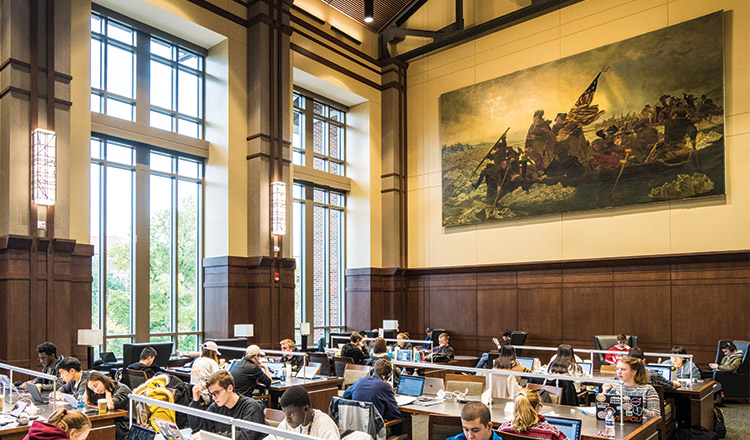Visitors to the Mullins Reading Room in the Wilmeth Active Learning Center (WALC) may be taken by surprise when gazing at the study area’s north wall. Quietly imposing, a near life-size replica of Emanuel Leutze’s masterpiece Washington Crossing the Delaware presides over hushed, contemplative students. The authorized copy of the famous work was commissioned in 1969 by author, historian, and cofounder of the Washington Crossing Foundation Ann Hawkes Hutton, wife of Purdue graduate Leon Hutton (S’29), and painted by nationally acclaimed artist Robert Bruce Williams. In 2014, the foundation loaned the painting to Purdue, stating that the University offered a compatible and trustworthy home. Initially displayed in the Class of 1950 Lecture Hall, it was predestined for installation in WALC.
One of the nation’s most recognizable paintings, the work depicts General George Washington and his troops crossing the Delaware River on December 25, 1776, prior to the Battle of Trenton. Leutze, a German-born American immigrant, was galvanized by Washington’s heroism and suffused the work with grandeur and glory, if not historical accuracy. Since its introduction, scholars have recounted many factual errors: the flag held by James Monroe was not introduced until 1777, the boat is much too small, and Washington would surely have been thrown into the river had he been standing in such a way. Despite these and other fallacies, the painting is beloved for its symbolism and patriotic commemoration.
At the official unveiling in September 2017, President Mitch Daniels urged observers to reflect upon the American ideal of the steady expansion of human freedom and expressed his hope that the events evoked by the painting would inspire all who witness it.
“Decades of Purdue students, as they study and commune under this magnificent canvas, will be reminded of the facts and the characteristics of true greatness; be reminded of the long and hazardous march of the freedoms we too often take for granted; [and] be reminded of the fragility of government of, by, and for the people and the duty of its beneficiaries to be vigilant against a world of so many predators, foreign and domestic.”

